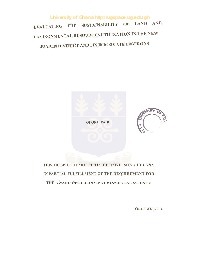UGSpace Repository
Evaluating The Sustainability Of Land And Environmental Resources utilization In The New Juaben District And Its Immediate Environs
JavaScript is disabled for your browser. Some features of this site may not work without it.
| dc.contributor.author | Opoku, P. | |
| dc.date.accessioned | 2021-09-06T14:17:25Z | |
| dc.date.available | 2021-09-06T14:17:25Z | |
| dc.date.issued | 2003-10 | |
| dc.identifier.uri | http://ugspace.ug.edu.gh/handle/123456789/36660 | |
| dc.description | PhD. Environmental Science | en_US |
| dc.description.abstract | Timely empirical information on the status of sustainability of land resource use is a critical strategic input for achieving sustainable land-use policy objectives. Lt is also important for maintaining and improving positive achievements in sustainable resource use. Examining relevant elements of both socio-economic and biophysical factors as findings are referenced to appropriate and recognized standards is the best approach to sustainability evaluation. Land resources of the New Juaben and the neighbouring districts have served as a medium for various land uses over the years. Yet, the sustainable use of these land resources has been questioned. This study, therefore, sought to evaluate the sustainability of land resource use in the area. Four dimensions of sustainable land and environmental resource use were considered: inter-generational equity, protection of water bodies and steep slopes from unsuitable land uses, efficiency in land allocation for suitable land uses and land-user perspectives of the suitability of cropping systems and land types. The investigation involved vegetation study, mapping of cropping systems with GPS, interviews of farmers satellite data analysis, spatial data modeling and Geographical information Systems(GIS) applications. The outcome indicated that, land resource utilization has not been sustainable. Per capita land consumption for urban construction has progressively increased from about 0.04 ha to over 0.2 ha. Steep slopes and areas within 100m of the Densu River have been denuded of forest vegetation and replaced with fallows and annual crop farms. Cocoa has been cultivated in soil types which are naturally unsuitable. Farmer perception of cropping systems has undergone significant changes, with enhanced rating given to the cultivation of food crops, and diminishing emphasis on tree crops such as cocoa. The trends of resource use could be attributed to various remote and proximate factors. Continually monitoring and evaluating the performance of land-resource utilization could provide feedback information necessary for redirecting resource use from the current unsustainable course 10 one of sustain ability. | en_US |
| dc.language.iso | en | en_US |
| dc.publisher | University of Ghana. | en_US |
| dc.subject | New Juaben District | en_US |
| dc.subject | The Sustainability Of Land | en_US |
| dc.subject | Environmental Resources utilization | en_US |
| dc.title | Evaluating The Sustainability Of Land And Environmental Resources utilization In The New Juaben District And Its Immediate Environs | en_US |
| dc.type | Thesis | en_US |
